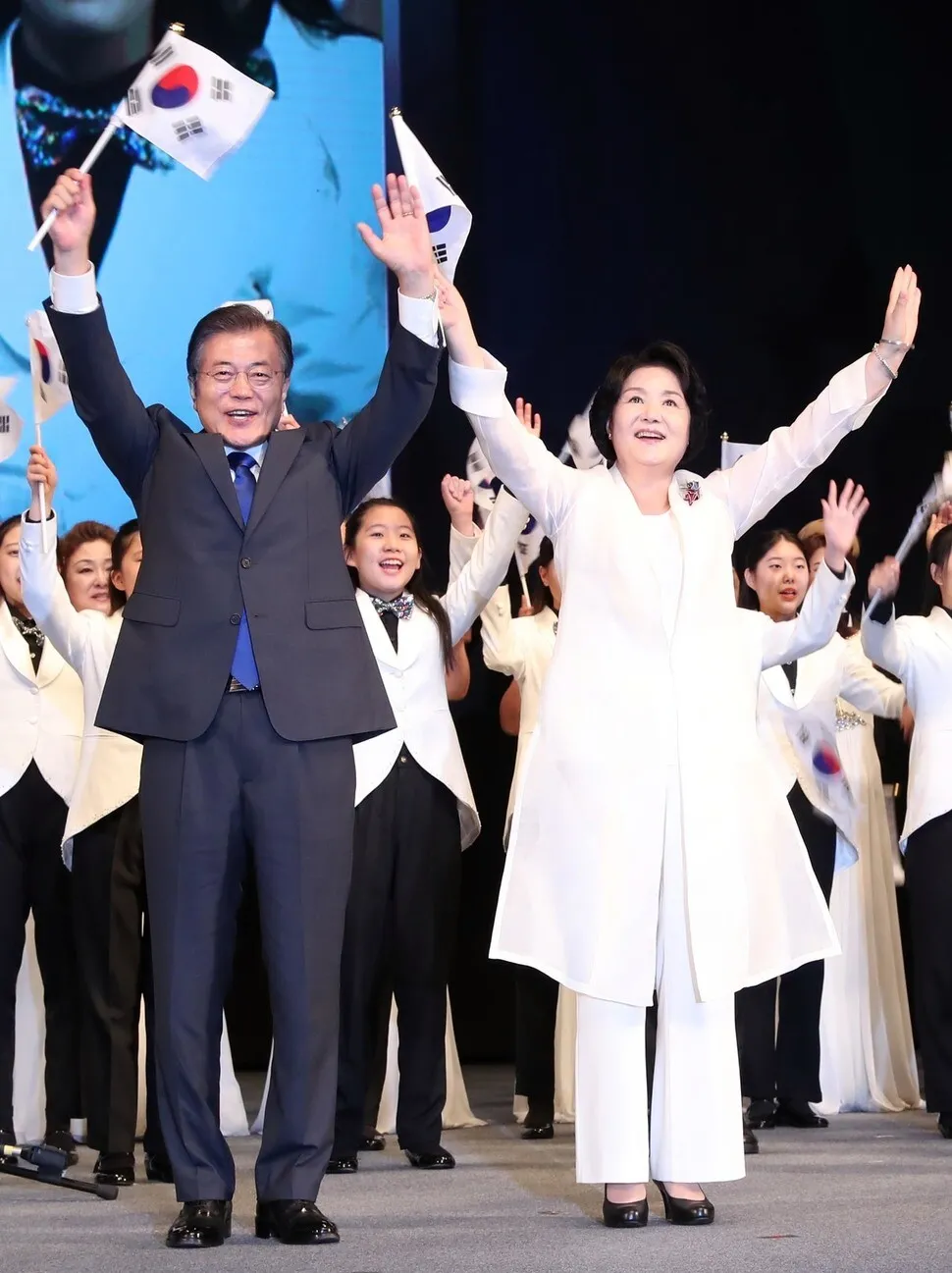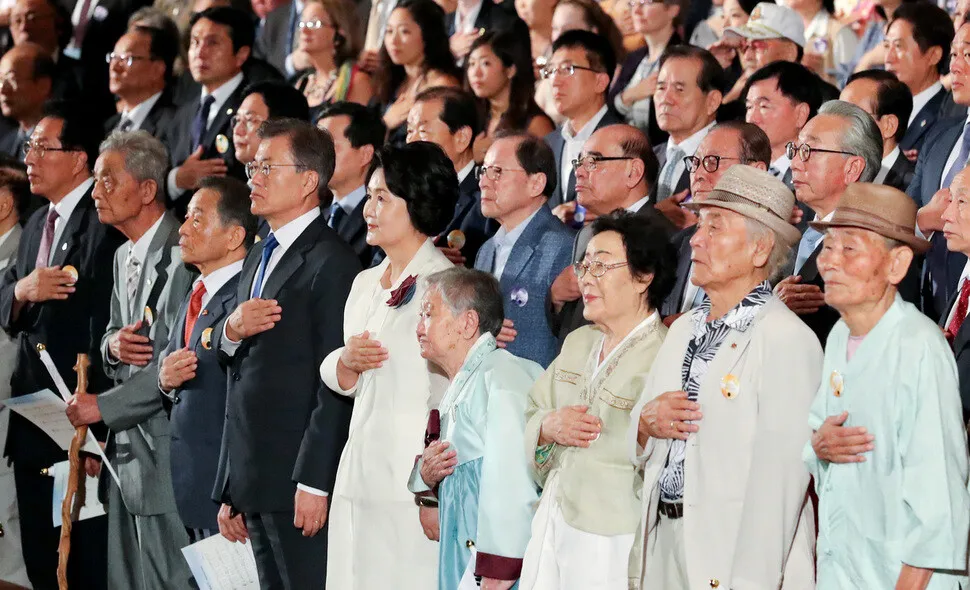hankyoreh
Links to other country sites 다른 나라 사이트 링크
[News Analysis] President Moon reasserts Korean initiative to resolve the crisis peacefully

South Korean President Moon Jae-in’s address on Liberation Day, Aug. 15, contained no new proposals for reaching a breakthrough in North and South Korea’s strained relations. Moon strongly asserted his determination to resolve the crisis on the Korean Peninsula through peaceful means and reasserted the basic principles of resolving the situation on the Korean Peninsula, which is centered around the North Korean nuclear issue. His address appeared to reflect the current security conditions on the Korean Peninsula, which have recently taken a turn for the worse because of North Korea’s ICBM launch, the UN Security Council’s adoption of a sanctions resolution against North Korea, and North Korea’s threat to launch an “enveloping strike” on Guam.
■ Moon determined to “stake everything on preventing war”
Moon left no doubt that he is determined for South Korea to take the initiative in overcoming the crisis on the Korean Peninsula. This means that he will take proactive steps to keep the peace if a clash between North Korea and the US over Guam threatens to spread to the Korean Peninsula. Moon’s pacifistic stance is nothing new. He has stated on several previous occasions that the North Korean nuclear issue and the division of the Korean Peninsula must be resolved through peaceful means.
In this Liberation Day address, however, the government’s commitment to be more proactive in leading efforts to resolve the crisis on the Korean Peninsula was expressed much more forcefully. This represents an even stronger assertion of the agreement reached during the South Korea-US summit meeting in June for South Korea to “take the driver’s seat” in resolving issues on the Korean Peninsula. Moon did acknowledge that the South Korea-US alliance is the cornerstone of South Korea’s security, stating that “the government will resolve the security crisis through close cooperation with the US based on the firm South Korea-US alliance.” But he also declared that “we cannot depend solely on our allies for our security. We must take the initiative in resolving issues on the Korean Peninsula.”
Moon’s declarations that “there must not be another war on the Korean Peninsula” and that “military action on the Korean Peninsula is a course of action that can be decided by South Korea alone, and no one can decide to take military action without the consent of South Korea” appear to have been messages for the US. Currently, wartime operational control of South Korea’s armed forces is held by the commander of ROK-US Combined Forces Command (who also commands US Forces Korea). But this commander’s wartime operational control is supposed to be subordinated to the orders and guidelines of the leaders of South Korea and the US and their top defense officials. While Moon did not explicitly mention the US military, this basically served as a warning about the possibility of the US military deciding to take unilateral military measures, such as a preemptive strike on North Korea, to the exclusion of South Korea.
In connection with this, Joseph Dunford, Chairman of the US Joint Chiefs of Staff, said during a press conference on Aug. 14 that the US deliberated with its allies about every decision. This seems to have been behind Moon’s assertion that South Korea and the US “were on the same page” on finding a peaceful solution to the North Korean nuclear issue, as Moon has emphasized. “President Moon made clear that he can say ‘no’ to the US on matters of war,” said Cho Seong-ryeol, chief of research for the Institute for National Security Strategy.
[President Moon’s] “determination that the destiny of the Korean Peninsula will be decided in a peaceful and independent manner was noticeable when he said he won’t rely solely on our allies,” said University of North Korean Studies professor Yang Moo-jin. “It’s too bad he didn’t make any bold decisions that could turn the situation around, such as calling for direct talks between North Korea and the US or suggesting that North and South Korea exchange special envoys in order to bring about peace.”

■ Reconfirming the Berlin Declaration
Moon’s proposals to North Korea represented little more than a tweaked version of what he had already said in his Berlin Declaration, without offering anything new. Instead, Moon concentrated on showing the sincerity of his basic position on the North Korean nuclear issue and on inter-Korean cooperation and exchange.
During his address, Moon reconfirmed several points: that freezing North Korea’s nuclear program was the starting point [for resolving] the North Korean nuclear issue, that the sanctions on North Korea were aimed at bringing about dialogue, and that [South Korea] does not want the North Korean regime to collapse or for unification to be achieved through absorption or any other artificial method.
Moon went to great pains to explain that the sanctions on North Korea were supposed to ultimately lead to dialogue. “Sanctions and dialogue are not mutually exclusive. Pursuing sanctions and dialogue simultaneously has paved the way for resolving problems,” he said. At this rate, Moon added, “We will have no choice but to further toughen sanctions and pressure on North Korea, even if we don’t want to.” Moon appeared to be countering North Korean objections that sanctions and dialogue cannot coexist with the argument that the sanctions are designed to lead to dialogue.
Moon also mentioned his plan for a new economic map for the Korean Peninsula, a plan he unveiled in the Berlin Declaration. “During the process of economic cooperation,” he said, “North Korea will naturally come to realize that its security is guaranteed even without a nuclear arsenal.”
“We will also leave open the door for military talks to prevent inter-Korean military tensions from aggravating the situation,” Moon said. He repeated his proposal to “start with the easy things,” calling once again for [North Korea] to allow the reunions of families divided by the Korean War.
By Park Byong-su, senior staff writer, and Noh Ji-won, staff reporter
Please direct questions or comments to [english@hani.co.kr]

Editorial・opinion
![[Column] Trump’s kingdom, Xi’s empire [Column] Trump’s kingdom, Xi’s empire](https://flexible.img.hani.co.kr/flexible/normal/500/300/imgdb/original/2025/1114/521763110114087.jpg) [Column] Trump’s kingdom, Xi’s empire
[Column] Trump’s kingdom, Xi’s empire![[Column] Putting the ‘demos’ back in democracy [Column] Putting the ‘demos’ back in democracy](https://flexible.img.hani.co.kr/flexible/normal/500/300/imgdb/original/2025/1112/4417629374603509.jpg) [Column] Putting the ‘demos’ back in democracy
[Column] Putting the ‘demos’ back in democracy- [Editorial] Prosecutors’ selective outrage is self-incriminating
- [Column] Korea’s ‘republic of lawyers’ is only making things worse
- [Column] Trump should win Nobel War Prize
- [Editorial] Boozing, luxe gifts, playing royalty: Yoon and Kim must pay for privatizing power
- [Column] Korea’s young men need liberating too
- [Correspondent’s column] Yet another fragmented Sado mine memorial
- [Column] Why is South Korea clamoring for yesterday’s nuclear submarines?
- [Column] The banality of Korea’s ‘democratic fascism’
Most viewed articles
- 1Forget their hiatus — can NewJeans survive their comeback?
- 2[Exclusive] Months before martial law, Yoon alluded to siccing military on lawmakers
- 3South Korea, US release fact sheet on deals, including support for uranium enrichment
- 4Lee’s approval rating rises to 61% despite uproar over Daejang corruption case
- 5[Column] Trump’s kingdom, Xi’s empire
- 6[Photo] Korea cheers on half a million students sitting college entrance exam
- 7[K-pop: To Love or Let Go] Is chart obsession ruining K-pop?
- 8How did Asians go from being called “white” to “yellow”
- 9Real-life heroes of “A Taxi Driver” pass away without having reunited
- 10New documentary refutes “comfort women” disinformation at the source